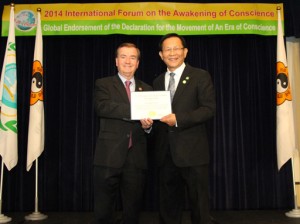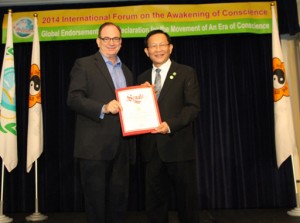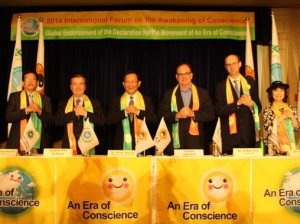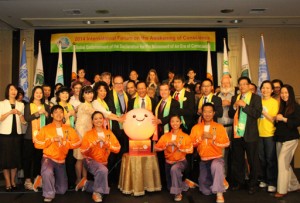International Forum on World Teachers’ Day: Exchange of Words of Conscience and Wisdom Congressman Ed Royce Lauds Dr. Hong Tao-Tze for His Efforts in Promoting World Peace
International Forum on World Teachers’ Day: Exchange of Words of Conscience and Wisdom
Congressman Ed Royce Lauds Dr. Hong Tao-Tze for His Efforts in Promoting World Peace
Reporter Cici Han, Los Angeles
October 5th is UN World Teachers’ Day; political leaders, such as Congressman Ed Royce, Chairman of Foreign Affairs Committee, California State Senator Bob Huff, Mrs. Huff, Mayor John Wuo of the City of Arcadia, and Council Member Mary Su of the City of Walnut, and distinguished educators attended the “International Forum on the Awakening of Conscience IV” at Pacific Palm Resort in La Puente, California. In response to World Teachers’ Day, the event, co-organized by 18 organizations in 7 countries, including Tai Ji Men Qigong Academy, the Association of World Citizens, NGO in consultative status with ECOSOC and associated with the UN DPI, and the Federation of World Peace and Love (FOWPAL), honored teachers at all levels and continued the positive energies generated in the movement of An Era of Conscience.
Congressman Ed Royce presented to Dr. Hong Tao-Tze the Certificate of Congressional Recognition, which read, “U.S. Representative Ed Royce of California’s 39th congressional district is pleased to acknowledge you for your work in developing the Tai Ji Men Qigong Academy. Thank you for facilitating positive values in our community and best of luck!” Senator Bob Huff presented to Dr. Hong the State of California Senate Certificate of Recognition, which read, “In recognition of your commitment to promoting good deeds and peace and love throughout the world.” Council Member Mary Su, on behalf of the City of Walnut, also presented a certificate of recognition to Dr. Hong in recognition of his efforts in promoting world peace.
Congressman Royce; Senator Bob Huff; Michael Selfridge, FOWPAL Director of Communications; Adjunct Assistant Professor Robert Vos of spatial sciences at University of Southern California; Dr. Kylie Hsu, Director of the Chinese Studies Center of California State University, Los Angeles; Dr. Chung-Ming Liu, retired Professor Emeritus of National Taiwan University; Christopher Villalobos, an English teacher at Arcadia High School; Muriel Tsai, principal of Walnut City Chinese Center; etc. shared their insightful reflections and suggestions for education as part of the panel discussion.
Dr. Hong Tao-Tze, the initiator of the movement of An Era of Conscience, President of FOWPAL, and Zhang-men-ren of Tai Ji Men, mentioned in his opening remarks, “The key to any good education lies in the conscience of each individual involved. When conscience is the core of education, we capture the true essence of education, which is to inspire people to better themselves.” Dr. Hong also indicated in the presentation of his thesis: “The awakening of conscience is the soul of education, like a compass pointing to the right path of life. It guides people to tell right from wrong and to know the difference between pride and humility. It prevents one from being greedy and enables one to conduct oneself properly and become truly enlightened, balanced, happy, and selfless. Following conscience is the way people can become peaceful and bring peace to the world. Education that includes conscience at the core, combines the essence of traditional and modern education, strikes a balance between technology and spirituality, and creates opportunity for the sustainable development of the Earth and humanity.”
After Dr. Hong’s presentation, Congressman Royce stated, “I enjoyed talking with Dr. Hong, and especially enjoyed his presentation. It’s profoundly important and significant that we’re reaching, especially through the new modes of being able to do this over the Internet, so many young people whose conscience can be inspired and who can commit themselves to the important role that they need to play in helping this world become a more peaceful place, a place in which there is justice but also solutions. His words resonated with me today.” Congressman Royce reflected that it is critical to “instill a greater depth of conscience and responsibility” in three key aspects: (1) instill values, (2) instill discipline, (3) and instill collaboration.
Dr. Liu , retired Professor Emeritus of National Taiwan University, and Dr. Vos, Adjunct Assistant Professor at USC, both commented at the forum that the top issue which affects the world conscience is climate change, and that an education toward a better understanding about and solution for it should be paramount. In order to show the magnitude of the challenges and damages caused by climate change, Dr. Vos compared the damage done to the world from human-induced climate change to the damage done by an asteroid impact.
Dr. Hsu asserted the need to provide an education that nurtures young students, helps them set big goals, and yet grounds them with core values. Chris Villalobos, an English teacher from Arcadia High School, advocated that the role for teachers is to provide inspiration to the younger generation to make a difference in the global community. Villalobos also underscored the importance of conscience with the concept of the collective common mind as studied by academics in the past. Villalobos closed his presentation by emphasizing conscience as “to do the right thing when no one is looking.”
The theme of this year’s World Teachers’ Day is “Invest in the future, Invest in teachers.” The organizers believe that education is the foundation of the shaping of personality, social stability, and national development; teachers play a very significant role in the society, and conscience is the soul of education. Therefore, the “International Forum on the Awakening of Conscience” was meant to awaken the conscience in everybody’s heart and to offer wise and conscientious reflections and advice about education to promote an era of love and peace in every corner of the world.
The movement of An Era of Conscience was initiated at the beginning of this year, and to date, more than 2,100 organizations from 185 nations have jointly participated in this movement. Teachers, principals, and students at various schools across the globe have shared their words of conscience and aspirations for world peace and love on ANEOC website. Everyone is invited to logon to the website for further detail: www.aneoc.org/en, and to endorse the Declaration for the Movement of An Era of Conscience.

Congressman Ed Royce (left) presents the Certificate of Congressional Recognition to Dr. Hong Tao-Tze, Zhang-men-ren of Tai Ji Men.

Senator Bob Huff (left) presents the State of California Senate Certificate of Recognition to Dr. Hong Tao-Tze, Zhang-men-ren of Tai Ji Men.

Panelists include Dr. Hong Tao-Tze, initiator of the movement of An Era of Conscience, president of FOWPAL, and Zhang-men-ren of Tai Ji Men (3rd from left); Congressman Ed Royce, Chairman of Foreign Affairs Committee (2nd from left); California State Senator Bob Huff (3rd from right); Adjunct Assistant Professor Robert Vos at USC (2nd from right); Professor Kylie Hsu, director of the Chinese Studies Center of Cal State, LA (1st from right); and Dr. Chung-Ming Liu, retired Professor Emeritus of atmospheric sciences from National Taiwan University (1st from left).

Panelists and honored guests light up the globe with a smiley face, symbolizing that everyone is an angel of conscience that can offer wisdom and conscientious words to improve education.
In Response to World Teachers’ Day (UNESCO): Awakening of Conscience is the Soul of Education
In 2014 Global Education Ranking, Asian countries claimed the top four spots. Additionally, the report shows that the effectiveness of a nation’s education is closely related to its economic performance. The fact is, the best performing nations have a cultural tradition of respect for teachers and learning. Thus, teachers and parents are willing to take more responsibility for the education of the youth. It should be noted that, this evaluation did not consider: creativity, critical thinking, or problem solving ability. This presents a problem that is worth addressing: an education that solely emphasizes academics but neglects other areas may raise stellar students in academic performance measures, but fail to cultivate them as world citizens who are well equipped with the skills and qualities required for success in this day and age.
An education for world citizens should enable them to achieve the following: realize that they are citizens of the world, emphasize the fact that all human beings are interconnected and interdependent on one another, foster caring for the peaceful and sustainable development of all humanity and the Earth, and cultivate a willingness to put in time, effort, and heart into improving the world. Outstanding young world citizens often hold great caring and understanding about world issues and cherish communicating and coordinating with people from different cultural backgrounds. They also are more eager to implement reforms and more courageous and enthusiastic about getting involved in worthy causes. Their enthusiasm brings more hope to the world. This became evident at the beginning of the 21st century when we saw a revolutionary wave of demonstrations for democracy known as the Arab Spring, which then triggered the Jasmine Revolution, the Sunflower Student Movement in Taiwan, and the on-going “Umbrella Revolution” in Hong Kong. As the global youth awaken to the principles of human rights and democracy, they bravely step forward to voice their concerns for themselves and the world. The future of peace and happiness lies in their hands.
The resolution of the 8th UNESCO Youth Forum held in 2013 pointed out that the youth of all nations are the driving forces for social change, economic development, and technological innovations. Investing in youth development and education is very crucial. The resolution emphasizes that youth should be given equal opportunities to participate in democracy and decision making processes, as well as an opportunity to understand and grasp current judiciary and legislative procedures. It is evident that the core function of modern education is to change people’s way of thinking and their way of conducting themselves. The promotion
of better understanding, skills, and values through mutual cooperation can help create to a more just, peaceful, and tolerant society, that necessary to solve the pressing challenges that all humanity faces in the 21st century.
Conscience is innate and unrelated to one’s level of schooling, political power, social status, or wealth. It is the most equal and precious asset given to all people by the Heaven. All people should protect the conscience in their hearts. Conscience is not only a lucky charm for self-protection and the foundation of success, but it can also stop evil and promote kindness. It can resolve feelings of hatred and build amiable relationships. The greenhouse effect of the awakening of conscience can save the Earth and all humanity.
Education unlocks the gate of knowledge, activates spiritual self-awareness, and leads to global awakening. In addition to spreading the idea of a holistic education for world citizens on campuses, we have to plant this idea in the media and society in order to maximize its influence. We must look at the issue of education from a whole-person approach so that it won’t be unbalanced or skewed. Education has incrementally impacted every one of our lives. Our daily conscientious thoughts and actions shape our character, and our collective thoughts and actions become social values and the culture of our nation. Despite the fact that there are differences in cultures, religious beliefs, and languages among people, conscience serves as the inner sense of what is right and wrong, it is universal, and transcends all human laws and regulations.
The awakening of conscience is the soul of education, like a compass pointing to the right path of life. It guides people to tell right from wrong and to know the difference between pride and humility. It prevents one from being greedy and enables one to conduct oneself properly and become truly enlightened, balanced, and selfless. Following conscience is the way people can become peaceful and bring peace to the world. Education that includes conscience at the core, combines the essence of traditional and modern education, strikes a balance between technology and spirituality, and creates opportunities for the sustainable development of the Earth and humanity.
Generations evolve as time progresses; conscience is the eternal constant stemming from the origin. Education is lifelong and rooted from the heart; passing the awakening of conscience to generations ahead.
Dr. Hong, Tao-Tze Zhang-men-ren of Tai Ji Men October 5, 2014



